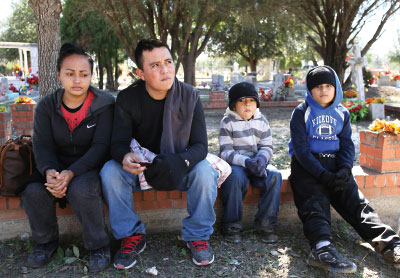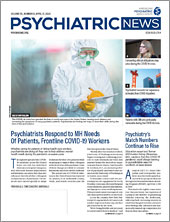The administration’s “public charge” rule that took effect in February is discouraging immigrants from obtaining mental health services and other types of health care just as the nation is gripped by the COVID-19 pandemic.
For the first time ever, officials look at immigrants’ use of various noncash federal taxpayer-funded benefits, such as Medicaid, food stamps, or housing assistance (Section 8 or 9). An immigrant’s use of such services for more than a total of 12 months within any 36-month period will result in denial of a U.S. visa or green card and lead to deportation.
The rule is the latest of a multitude of actions the administration has taken to reduce legal and illegal immigration.
A major concern is that discouraging use of preventive health services will result in the need for higher-cost critical care treatments, according to APA and other front-line physicians (see
here).
“The unfortunate outcome of this rule is that it reduces the safety and health of our community as a whole,” said Eric Rafla-Yuan, M.D., chief resident at the Community Psychiatry Program at the University of California, San Diego, and an APA/APAF SAMHSA Minority Fellow. “Entire families, including U.S. citizens, are now afraid to take advantage of health care, vaccinations, and school lunches, if even one person in their household is a noncitizen.”
Divya Chhabra, M.D., a child and adolescent psychiatry fellow at New York-Presbyterian/Columbia University and Weill Cornell Medicine and chair of the APA/APAF SAMHSA Minority Fellowship, said she’s noticed that immigrant patients are more fearful and reluctant about engaging with the health care system in general than their peers. In one of the emergency rooms where she works, she frequently sees immigrant children and adolescents who had attempted suicide and had never seen a psychiatrist, compared with nonimmigrants who tend to come in earlier in their illness course or already had outpatient care.
One recent patient who had suffered severe sexual trauma and was experiencing domestic violence was afraid to tell Chhabra her story at first because she was an undocumented immigrant and feared deportation. “If the patient doesn’t feel comfortable telling you their story, then you cannot help them,” Chhabra said.
Rafla-Yuan pointed out that undocumented immigrants have long avoided use of any public services due to fear of being found and deported, but this new rule targets immigrants who’ve come here legally and have their paperwork. “Some of these individuals have already been here for years and have family members here. ... Now they’re hearing on the news that use of help will be held against them.”
Exclusions to Public Charge Rule
Certain public benefits and individuals won’t be considered when it comes to public charge determinations, including the following:
•
Children’s Health Insurance Program benefits or Medicaid received by children under age 21, while pregnant/60 days postpartum, or during an emergency.
•
School-based services or benefits.
•
Benefits received by other members of an applicant’s household.
•
Benefits received by refugees and asylees.
However, experts say these exclusions aren’t meaningful because the rule is so complex and immigrants aren’t sure when it applies. “To somebody not extremely familiar with U.S. government policy, they fear that if they use any services at all, it will count against them,” Chhabra said. “So they avoid everything.”
Chhabra is concerned that some immigrants might face higher exposure to coronavirus because they live in more crowded conditions and cannot perform their jobs from home. “They might avoid getting tested when it is indicated or coming into the emergency department for COVID-19 treatment for fear it will count against them,” she said.
The U.S. Citizenship and Immigration Services issued an alert on March 17 encouraging all individuals with COVID-19 symptoms to seek necessary medical treatment or preventive services, noting that said noncitizens will not be penalized under the public charge rule for doing so.
In general, Rafla-Yuan said psychiatrists can help by thinking about how to support affected patients as they navigate these challenges, advocating for their rights, and reassuring patients that they “are here to support them in keeping their family together,” he added. “At a minimum, it’s good for psychiatrists to know this is an added stressor in the lives of their immigrant patients and families that may affect the way they are able to access services.” ■
APA has been very active in advocating for legislative and regulatory actions to help patients, the public, and psychiatrists during the COVID-19 crisis see
here.
To do this work, APA needs more APA members to participate in advocacy at the local, state, and national levels. If you are interested, please visit
here or send
us an email.

